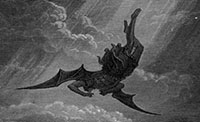Sons of Belial: Difference between revisions
No edit summary |
mNo edit summary |
||
| Line 3: | Line 3: | ||
The '''sons of Belial''' are the seed of the [[fallen angel]] Belial, who sought to supplant the seed of Christ at every hand. In the Old Testament, ''belial'' is usually interpreted as a common noun meaning worthlessness, ungodliness, or wickedness. (Deut. 13:13; Judges 19:22; 20:13; I Samuel 2:12; 10:27; 25:17; II Samuel 23:6; I Kings 21:10, 13; II Chronicles 13:7). In II Cor. 6:l5, ''Belial'' is used as a proper name for a prince of demons. | The '''sons of Belial''' are the seed of the [[fallen angel]] Belial, who sought to supplant the seed of Christ at every hand. In the Old Testament, ''belial'' is usually interpreted as a common noun meaning worthlessness, ungodliness, or wickedness. (Deut. 13:13; Judges 19:22; 20:13; I Samuel 2:12; 10:27; 25:17; II Samuel 23:6; I Kings 21:10, 13; II Chronicles 13:7). In II Cor. 6:l5, ''Belial'' is used as a proper name for a prince of demons. | ||
Some Jewish apocryphal works make Belial synonymous with [[Satan]], but this is actually | Some Jewish apocryphal works make Belial synonymous with [[Satan]], but this is actually the name of a different fallen angel, whose sons took embodiment after the fall of [[Lucifer]]. | ||
Belial is described in Milton’s ''Paradise Lost'' as one of the fallen angels. | Belial is described in Milton’s ''Paradise Lost'' as one of the fallen angels. | ||
Revision as of 23:29, 3 July 2020

False Hierarchy
The sons of Belial are the seed of the fallen angel Belial, who sought to supplant the seed of Christ at every hand. In the Old Testament, belial is usually interpreted as a common noun meaning worthlessness, ungodliness, or wickedness. (Deut. 13:13; Judges 19:22; 20:13; I Samuel 2:12; 10:27; 25:17; II Samuel 23:6; I Kings 21:10, 13; II Chronicles 13:7). In II Cor. 6:l5, Belial is used as a proper name for a prince of demons.
Some Jewish apocryphal works make Belial synonymous with Satan, but this is actually the name of a different fallen angel, whose sons took embodiment after the fall of Lucifer.
Belial is described in Milton’s Paradise Lost as one of the fallen angels.
See also
Sources
Mark L. Prophet and Elizabeth Clare Prophet, Lost Teachings on Finding God Within
Pearls of Wisdom, vol. 14, no. 5, January 31, 1971.
